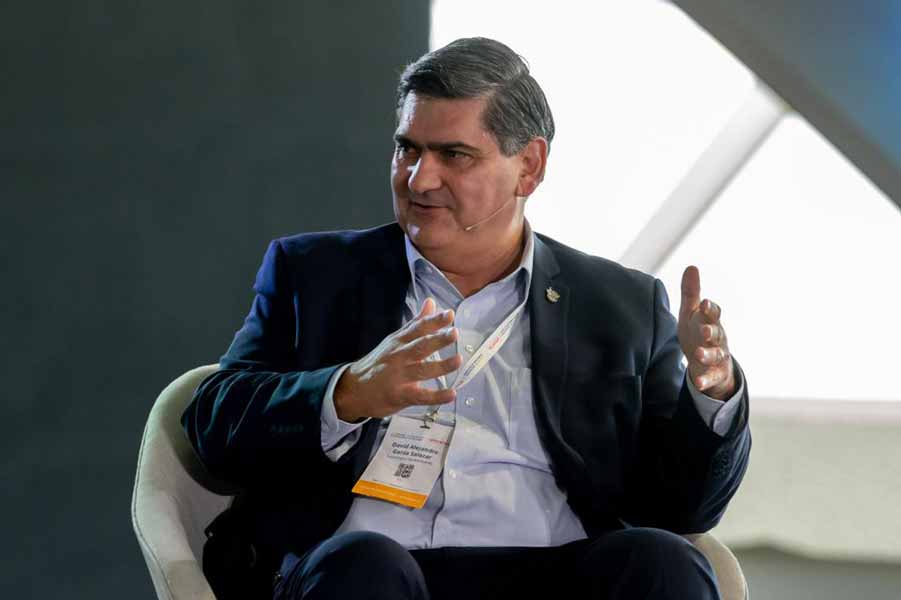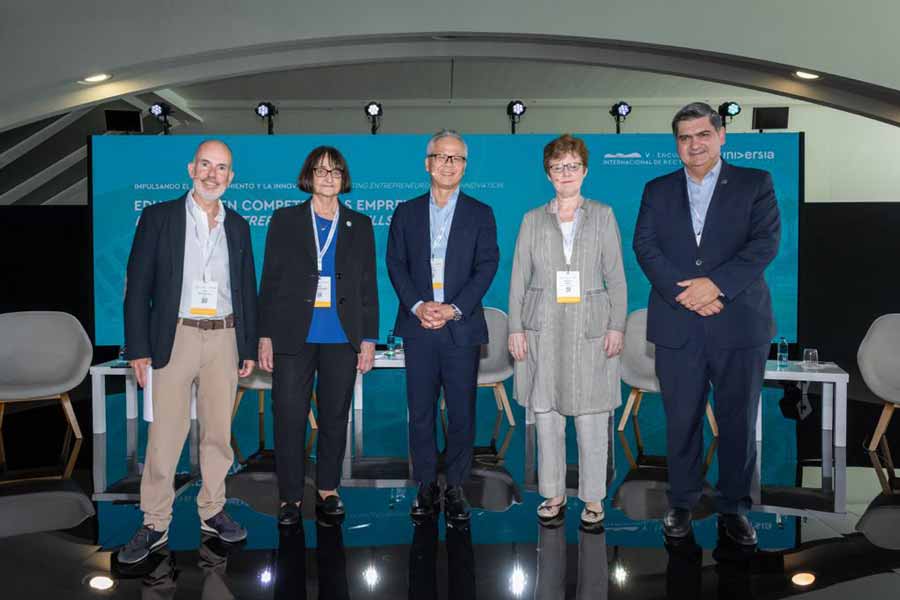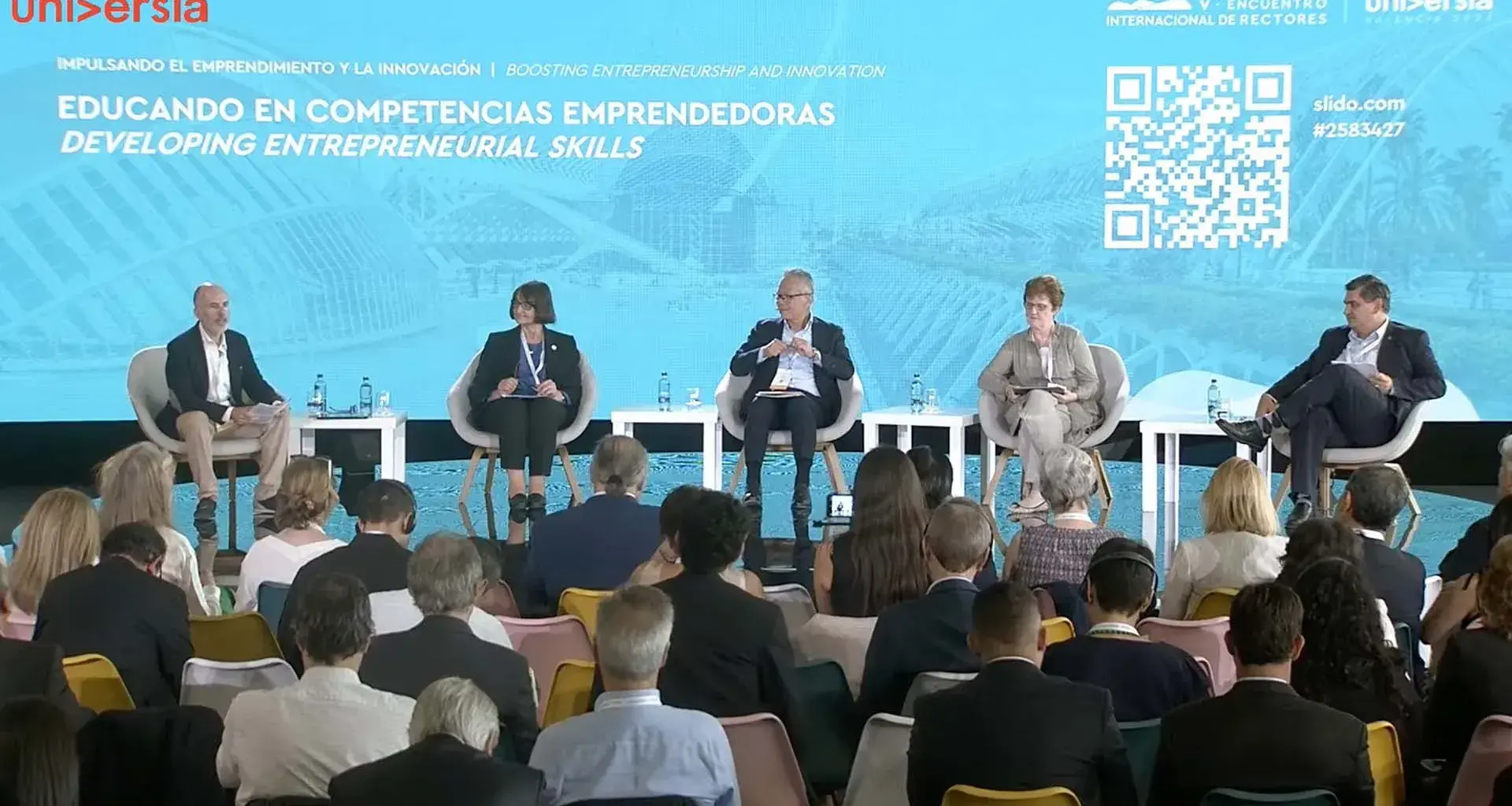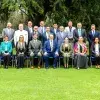David Garza, Rector and Executive President of Tec de Monterrey, shared the importance of developing the entrepreneurial spirit of university students during the 5th Universia International Rectors’ Summit in Valencia, Spain.
Garza participated in the Developing Entrepreneurial Skills panel, in which he listed some of the skills that universities require in order to create an entrepreneurial culture.
The Tec’s rector also gave examples on how to develop students’ social and entrepreneurial skills.
Participating in this panel were Andrea Nolan, Principal and Vice-Chancellor of Edinburgh Napier University; Rosa Devés, Rector of the University of Chile; and Ken Matsumo, Murata Vice President of Academic Affairs and Dean of Babson College.

Developing an entrepreneurial spirit at college
During the discussion, the participants shared their thoughts on how important it is for universities to develop the entrepreneurial skills of their students, academics, and rectors.
“The world of today needs people with an entrepreneurial spirit,” said Garza, listing challenges such as the post-pandemic world, digital transformation, the arrival of ChatGPT, inflation, and the transition to a climate-neutral economy with clean energy and technologies.
“All these components indicate that we cannot continue with traditional models. Entrepreneurial mindsets are required. Although there is no one recipe for creating them, we are convinced that one of the key elements must be to involve students,” said Garza.
He highlighted that 50% of Tec de Monterrey students receive entrepreneurial experiences where they have courses with practical experiences and real-world problem solving.
What’s more, there is an entrepreneurial ecosystem accompanying them, such as incubators, bootcamps, international connections, and training partners.
“Students develop best during pragmatic experiences, where they’re faced with situations of high uncertainty, where they’re likely going to make mistakes, but you see how they react and how they get up and try again.”
“The world of today needs people with an entrepreneurial spirit.” - David Garza
What does it take to create an entrepreneurial culture?
During the panel, the rectors also spoke about the skills rectors and universities require to create an entrepreneurial culture.
The rector of Tec de Monterrey listed uncertainty management, adaptability, and flexibility to fuel entrepreneurial spirit as essential skills for this purpose.
“In the academic world, we’re very critical. If there’s a new and innovative proposal, we wonder who made it and where the evidence proving it works is, but there’s uncertainty in the real world. There are times when we’re going to have to be the first ones to try it out,” he said.
“The world of today needs people with an entrepreneurial spirit,” added Garza.
For her part, Chilean rector Rosa Devés pointed out the importance of consolidating robust entrepreneurial ecosystems that support students both inside and outside of school.
Meanwhile, the dean of Babson College, Ken Matsumo, explained that it’s necessary to train teachers who can teach entrepreneurship and therefore multiply the effect on other teachers and students.
He also said that we cannot do it alone; collaboration between universities is needed so that they can learn from each other, share experiences, and strengthen each other.
For example, Babson College and Tec de Monterrey are collaborators, and they are looking to make further connections at the summit.
How can we develop the social and entrepreneurial skills of university students?
In answer to one of the questions from panel attendees on how to develop the social and entrepreneurial skills of university students, Garza gave the example of the “Enterprising with Purpose” Tec Week.
He pointed out that this space allows students to discover entrepreneurship as a possible means to fulfilling their life purpose, while connecting it to climate change and the Sustainable Development Goals (SDG).
These experiences make it possible to help entire communities while developing students’ social and entrepreneurial skills, he explained.
“This has to do with transversal skills. Through certain programs, Tec students can ask questions of graduates with their own businesses, and that is very motivating to them,” said David.
In fact, 41% of Tec graduates are entrepreneurs; of these businesses, 14.5% are involved in social enterprises.
During his visit to Spain, Garza will participate in further activities, such as the swearing-in of the EXATEC Spain association.

Tec Rector meets with Tec graduates in Spain
During David Garza’s visit to Spain, he also met with the EXATEC association and was present at its swearing-in ceremony.
These activities were part of a program known as Meet and Greet, which brings together members of the Tec’s leadership team with graduates.
“The idea is for them to have contact and for our graduates to be aware of what the Tec is doing,” explained Gaspar Fuentes, Director of Alumni Relations.
To this end, the Tec’s rector discussed the institution’s past, present, and future, speaking about research projects, internationalization, Distrito Tec, and the Academy of Excellence.
70 people attended the event, 60 of whom were Tec de Monterrey graduates, which coincided with the swearing in of EXATEC Spain’s Board of Directors.
About the Universia International Rectors’ Summit
The 5th Universia International Rectors’ Summit forms part of the support that Banco Santander has provided to higher education for over 25 years, as part of its commitment to move towards a fairer, more sustainable, and more inclusive society.
This year’s summit takes place in Valencia, Spain, from May 8 to 10, 2023, under the heading “University and Society”, with 3 key topics: life-long learning; promoting entrepreneurship and innovation; and developing networks and interconnection.
It is attended by 700 rectors from 14 countries, representing 14 million students from across the globe, who will talk about the role of universities as a driving force for a more sustainable social and economic development.
The event was opened by Spanish Prime Minister Pedro Sánchez, along with Ana Botín, Executive Chairman of Banco Santander and Universia, and Enrique Graue, Rector of UNAM and Chair of the Summit’s International Committee.
Botín said that Banco Santander will dedicate 400 million euros by 2026 to promoting education, employability, and entrepreneurship.
The resolutions from the Universia International Rectors’ Summit will appear in the ‘Valencia Declaration,’ which will reflect rectors’ commitment to universities’ progress to help society move forward.
This event will build on previous summits in Salamanca, Spain, in 2018; Rio de Janeiro, Brazil, in 2014; Guadalajara, Mexico, in 2010; and Seville, Spain, in 2005, and is organized by Banco Santander.
The event can be live-streamed on Banco Santander’s corporate website and via Santander, Santander Universities, and Universia’s corporate profiles.
See David Garza’s participation here (in Spanish):
ALSO READ:





